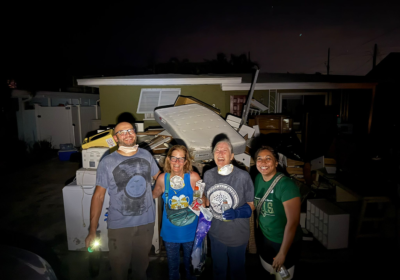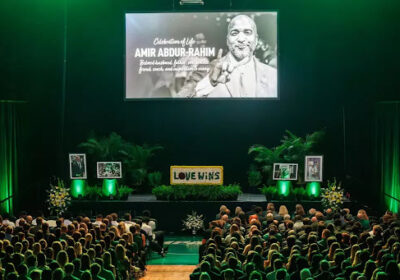Hope after tragedy: John Dengler’s impact on homelessness

establishment of The Well, Inc. and WellBuilt Bikes. SPECIAL TO THE ORACLE
For John Dengler, a person’s relationship with the homeless population isn’t charity — it’s a mutually beneficial interaction with human connection at its center.
John Dengler, executive director of The Well Inc. and CEO of WellBuilt Bikes, had the room of about 25 people laughing even when discussing touchy subjects, such as car accidents and homelessness guilt at the Hope for the Homeless meeting last night.
Held in the Marshall Student Center, many attendees were members of Hope for the Homeless, a student organization to help Tampa’s homeless population, as well as members of the Global Citizens Project. But most were curious visitors.
Though Dengler’s personality lit up the room, the attendees grew silent as he told this story of recovery.
As a teenager, Dengler was hospitalized after driving drunk and getting into a head-on collision. He said he spent weeks on a ventilator after having his face restructured with metal plates and his mouth wired shut.
He returned to school his senior year in high school in a wheelchair and unable to consume solid foods.
“I go back this far in my story because I think the experience of pain, alienation and marginalization played a huge role in my formation over time,” Dengler said.
“They graduated me which was like, ‘Here’s this test, we feel bad for you.’ So I walked, or crutched, across the graduation stage.”
Dengler continued his education at USF and was frank to the audience about his partying lifestyle.
“I had no interest in being here,” Dengler said. “I was just partying.”
Little did he know that a trip on the popular hallucinogen, LSD, would take him on what he called a “religious experience.
“It changed me,” Dengler said. “It changed me significantly. But the main thing it did in my mind was make all of it meaningful. All of my pain had a purpose. It came flooding back in this experience and it felt like there was a reason for it.”
Hope for the Homeless isn’t affiliated with any religion, but the people in the room were eager to hear how this religious experience contributed to Dengler’s involvement with the homeless.
“I went looking for a church, that’s what I figured people who do this kind of stuff do,” Dengler said. “I hated it. I still hate it. Don’t want to go, I just don’t like it.”
Dengler still looked into the church to find ways to help people though, where he found his first opportunity. A local church was gathering food to hand out to people who were homeless, and Dengler was able to help out and gave food and a blanket to a man sitting in an alley.
This is where Dengler first began his work with the homeless. This would be the point at which most people would pat themselves on the back for one act of kindness, but that was not the case for Dengler.
He told the crowd, who were anticipating an explanation, about the two pieces of paper he wrote on as soon as he got home comparing his situation to the homeless man’s.
“I think people do this kind of thing to feel good but I don’t feel good, I feel like s***,” Dengler said. “Because this brother is laying in an alley that reeks of urine, without food, and I’m at home, with a blanket, and a pillow, and running water, and a roof over my head, and a fridge, and a car that I got here in and oh, by the way, the water heats up.”
The rest of the meeting continued this way, with the room invested in Dengler’s relationship with the homeless.
After his experience with the man in the alley, Dengler rented a house with his friends to welcome impoverished people to come and eat, do laundry, sleep and fulfill any other necessities. In addition, they provided rides to anyone who wanted to come to their home. They did this and continued to do it even after someone was stabbed and one had their car stolen.
This home would lead to the establishment of The Well, Inc. and WellBuilt Bikes.
Dengler said that homeless people have the power to enrich his life.
“To me, Hope for the Homeless, a club that is called that, is hope for you — that these experiences can change you,” said Dengler. “I’m hopeful that you can build these relationships that have shaped me so much.”
Dengler strongly believes in the “wealth of the poor,” which means, according to him, that people who are poor and impoverished have wisdom and knowledge that others don’t have.
The students in the room applauded Dengler as he ended his story and the president of Hope for the Homeless thanked him.
“You can either get out of this world or crash your life into it,” Dengler said. “Over time, I opted for the latter.”






